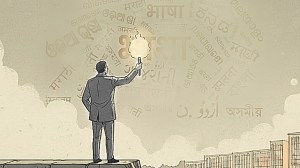H-1B changes explained: How Trump’s proposed rule will favour higher-paid jobs over entry-level workers
H-1B visa rule changes explained: Attorneys tell The Indian Express the proposal could face legal challenges before taking effect in the 2026 H-1B lottery.
 Trump H-1B rule: Trump addresses the 80th session of the United Nations General Assembly, Tuesday, Sept. 23, 2025, at U.N. headquarters. (AP Photo)
Trump H-1B rule: Trump addresses the 80th session of the United Nations General Assembly, Tuesday, Sept. 23, 2025, at U.N. headquarters. (AP Photo)H-1B visa rule changes: The Trump administration has unveiled major changes affecting the H-1B visa program. This week, officials announced two big moves. First, a significant fee increase – requiring employers to pay $100,000 for new H-1B visa petitions – and a plan to overhaul the H-1B lottery to tilt the odds in favour of higher-paid jobs.
Officials say the proposals aim to “protect American workers” by discouraging use of the visa for lower-wage positions and giving an edge to “higher-skilled and better-paid” foreign workers.
The changes could significantly affect international students and professionals hoping to live and work in the U.S.
Q: What exactly is changing in the H-1B selection process?
The key change is how H-1B visas will be allocated when demand exceeds the annual cap. Until now, H-1B visas (85,000 available each year for new hires) have been decided by a random lottery. Under the new proposal, the lottery would no longer be entirely random but a “weighted” draw that gives higher wage levels better odds.
In practice, workers with higher-paying job offers would have greater chances of selection than those with entry-level salaries. The Department of Homeland Security (DHS) says it wants to “move away from a purely random selection process to a weighted selection process” for H-1B registrations. Speaking to The Indian Express, Texas-based immigration attorney Chand Parvathaneni said: “At this point it is just a draft and not the final rule. Once the final rule is published it might get challenged in court…”
Q: How will the new wage-based selection system work?
Under the proposal, each H-1B candidate will be placed in a government-defined wage tier (Level 1 through Level 4) based on the job’s offered salary. These tiers are drawn from the US Department of Labour data for each occupation and location. Level 1 is entry-level; Level 4 is the highest expert-level wage. Employers must list the job’s Standard Occupational Classification (SOC) code, location, and OEWS wage level while filing.
If registrations exceed available visas, USCIS (Citizenship and Immigration Services) will run a weighted lottery that assigns more entries to higher wage levels:
- Level 4 (highest wage): name entered four times
- Level 3: entered three times
- Level 2: entered twice
- Level 1 (lowest wage): entered once
In other words, a candidate offered a Level 4 salary would get four chances to be picked, while an entry-level worker would have only one. The system is meant to tilt visas toward higher-paid applicants but still leave a chance for those in lower tiers.
Each individual can only be selected once, even if multiple employers file for them. If one employer offers Level IV wages and another Level I, the applicant will be treated at the lower level. This is intended to block “gaming” of the system by artificially inflating wage offers.
Q: Will this make it harder for entry-level or junior workers to get selected?
Yes. By design, applicants in the lowest wage tier will have fewer chances than those in higher tiers. Under the current random lottery, all applicants — from fresh graduates to senior professionals — had equal odds. The new system would shift the balance toward those with higher salaries.
Q: Is this the first time wage levels are being used this way?
No. In late 2020, during Trump’s previous term, DHS finalised a similar wage-ranking rule. It never took effect. The Biden administration paused it before the March 2021 lottery, and a federal court struck it down in September 2021. The rule was formally withdrawn soon after.
Q: When will these changes take effect, and are they certain to happen?
The wage-based selection system is still a proposal. DHS published the draft on September 24, 2025, opening a 30-day public comment period. After reviewing feedback, the agency will have to complete the regulatory process before finalising the rule — a timeline that could take months.
The administration wants the new system ready for the FY2027 H-1B cap, i.e. the March 2026 lottery. But attorneys caution it may face legal hurdles. Critics argue the Immigration and Nationality Act requires visas to be issued in the order petitions are received, not through a wage-based lottery.
“Lawsuits are expected. There is a view that it might have to go through Congress to make changes to the lottery process and not through rulemaking. There are arguments on both sides, and lawsuits are potentially possible to see if the Administrative Procedure Act rulemaking process is valid or if it has to go through Congress,” Parvathaneni explained.
- 01
- 02
- 03
- 04
- 05






































